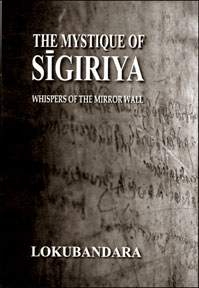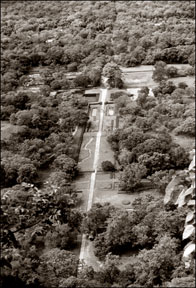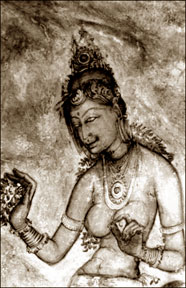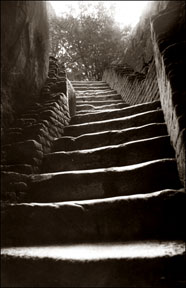|

Who said graffiti is bad?
|

The man we didn’t know |
 Title: The Mystique of Sigiriya:
Whispers of the Mirror Wall Title: The Mystique of Sigiriya:
Whispers of the Mirror Wall
Author: W. J. M. Lokubandara
Publisher: Godage International
Publishers
by Aditha Dissanayake
[email protected]
His Excellency Robert Blake, the Ambassador for the USA said it best
when he described how he had often wondered what goes on behind the calm
countenance of the Speaker when all around him was in turmoil during
certain sessions in parliament.
Now he (and the whole world) knows. When the members of parliament
were bashing each other, calling each other by unprintable names and
creating chaos, the Speaker, W. J. M. Lokubandara, remained calm with
that gentle smile on his face because his mind was elsewhere. He was
day-dreaming of the Sigiri damsels.
He is not alone. There have been many before him who had fallen in
love with these 'long-eyed' golden coloured, heart-shattering ladies;
many who had been smitten by their beauty and broken into poetic
raptures.
The Speaker, though, is different to these other lovers. Instead of
writing his own songs in praise of the damsels he pays tribute to his
predecessors, those lovers before him who loved Sigiri with the same
passion and who recorded them on the mirror wall, by rendering their
innermost thoughts into the English language.
Thanks to "The Mystique of Sigiriya" those who are unable to read the
Sinhala version Sigiri gi siri and certainly the inscriptions themselves
can now know the thoughts of the visitors to Sigiriya more than a
thousand years ago.
Ambassador Blake the next time he climbs the Sigiri rock with his
wife and two daughters, would know that a visitor called Tilimala of
Ruhuna too climbed the same rock and thought "The slender women among
the golden-coloured ones on the mountain side, took my mind solely to
themselves. O long-eyed one, what may I do to sustain myself?".

Did Kashyapa’s thoughts fly towards Kalawewa? |

“O long-eyed one, what may I do to sustain myself?” |
Proving that the graffiti themselves are perhaps more enticing than
the damsels His Excellency Alok Prasad, the High Commissioner for India
says he spent one whole sleepless night with "The Mystique of Sigiriya".
Could the reasons for this enchantment lie not only in the beauty of
the damsels, not only in the skills of the poets who wrote on the mirror
wall but in the remarkable manner in which the Speaker, himself, wields
his pen? Critics like Prof. Wimal Dissanayake says "Yes".
"His comments, pithy, relevant and always insightful serve to widen
the horizon of understanding of the English reader" while Prof. Ashley
Halpe insists the author is not a rasika as he modestly calls himself
but a 'sahrdaya- an informed critic and a deeply responsive aficionado
who has himself drunk deeply of the Pierian spring".
No wonder, for the Speaker recalls growing up on a "staple of
classical oriental poetry with the rich imagery of Kavusilumina, the
polyphonic rhythms of Mayura Sandesa," as well as the Guttila Kavya and
the Salalihini Sandesa. Not satisfied with the few Sigiri verses that
were prescribed for his exams he had read Professor Paranavithane's
Sigiri Graffiti not once but an uncountable number of times.
The melodic verses on the mirror wall became so much a part of his
life that soon he began to see them as an "ever obliging good friend".
Whenever he was overcome by loneliness, sadness or adversity, he says it
was the Sigiri Graffiti that came unfailingly to his rescue.
And rescue him, they did, more than twenty one years ago. The day was
January 1st, 1977. The place, Haputale, or rather to be more precise the
Sunday fair at Diyatalawa. In the presence of the late Hon. J. R.
Jayewardene, he was about to make his first speech "Standing up to face
the crowd my mind went blank.

Did their ancestors too stand here? |

The silent stone stairways |
I could see nothing, feel nothing and felt certain could say
nothing.Then out of the depths of that frightening void...came a verse
that escaped my frozen lips "Topa vanavu himin...a graffitto from the
mirror wall".
Comparing the suppleness of the graffiti to the Buddharaja Kalka (a
therapy used by Ayurveda physicians either with ginger, honey or lime
juice depending on the ailment) he says he has used this "pellet" in the
academic world, on the political platform and in Parliament - with honey
when he addresses his electorate, with lime when he is in Parliament and
on the occasion when he was present at the launch of the website at the
Attorney General's Department, not with honey or lime but with ginger.
Honey, lime, ginger and melons too. Unlike Professor Paranavithana's
Sigiri Graffiti with its intricate, sober, sleep-evoking details on
epigraphy, grammar etc., the Speaker imagines what would have taken
place in the minds of the poets, as they scribbled their thoughts on the
mirror wall, and in doing so brings them back to life.
He believes, for example, the poet who compares the coquettish smiles
of the Sigiri damsels to the seeds of a melon was "tormented by the fire
of lust as a result of making love to [her] on the false assumption that
she possessed coolness". He writes "Her teeth, sweet words and eyes are
reminiscent of the melon in one respect or another... Yet, this likeness
is only on the outside.
What would it be like after partaking of this melon and tasting it?"
He then answers the question himself. "The melon is a fruit that cools
the body. It dispels heat too.The very thoughts of the melon bring about
a sense of coolness.
On the other hand, thoughts about the damsels usually arouse the heat
of passion. They arouse a feeling of heat or fire. The mind is kindled.
It starts burning through lust. It torments the mind. There is thus no
peace. In a way, though cooling, this is the nature of the melon too.
This poem...attracts our mind like the coolness of the melon".
Next, he finds a deeper meaning in the lines and asks "Could it not
be that a lesson learnt through experience in life is echoed here in the
poem?". The coolness is felt only when one eats the melon. Could this
mean that what is seen as similar externally is internally very
different?
Who would know? The solitary eagle in the sky? (p.94), the silent
stone stairways (p. 8) the shadow of a tree (p.106) the drops of water
on a lotus leaf?
Perhaps. The photographs of Patrick Ratnayake, Gamini Jayasinghe,
Mahesh Prasantha, Upul Ranepura and Nuwan Duminda, side by side the text
enhance the haunting mystique of Sigiriya. Gazing at them it is easy to
join the Speaker as he muses what kind of thoughts Kashyapa would have
had"as he looked out of the palace window, at the far away moonlit
skies". It is sad indeed that the King's thoughts would have "flown
across towards Kalawewa without ever being recorded on the Mirror Wall".
(p. 11).
Had he but known the visitors to his palace in the centuries ahead
would use the Mirror Wall to scribble their thoughts, King Kashyapa
would surely have provided a visitor's book instead. Lucky for us that
he did not. How else would we know that Mati, Pota Devu, Midhalu Dal and
a host of others visited Sigiriya if they had penned their thoughts on
an ephemeral puskola?
As it was for Dr. Ananda, W. P. Guruge, Senior Special Advisor to the
Director General of UNESCO, as it was for His Excellency Alok Prasad,
who were so captivated they forgot the time pass, if at any point during
"The Mystique of Sigiriya, you find yourself in your own world, there is
a simple explanation; you have reached the end of the book, you are back
from Sigiri thousand five hundred years ago and there are several missed
calls on your mobile.
Until that moment, it is safe to say the book permits no respite.
So, who said graffiti is bad?
Calling all scribes
Entries for Volume 14 Number 2 of Channels:
The English Writers Cooperative of Sri Lanka hopes to publish Volume
14 Number 2 of Channels in mid 2008, and is now collecting material for
this issue. The EWC invites entries of short stories, poems,
translations and excerpts from plays and novels. Members of the EWC are
permitted to participate.
 Rules: All work should be in English, original and unpublished. Rules: All work should be in English, original and unpublished.
Short Stories: Maximum 2,500 words of creative writing.
Poems: Maximum 40 lines of creative writing.
Plays: Maximum 3,000 words of creative writing (either complete plays
or excerpt) Translations: translations from other languages must be in
English - maximum 3,000 words.
Submitted with written permission from the original Author if s/he is
alive, or from the Trustees of the Estate of the original Author.
Copy of such authorization should be enclosed with entry.
Format : Manuscripts should be neatly typed double spaced on A4
paper, one side only, one inch margin all round.
Pages should be clearly numbered with author's name, address,
telephone and email details at the beginning and end of each story, play
and translation and on each page of poetry. Pages should be stapled
together.
The Editorial Board's decision will be final in the selection of
suitable material for publication, and reserves the right to edit where
it deems necessary.
Fee: An entrance fee of
Rs 50/= per short story
Rs 50/= per translation
Rs 50/= per excerpt of novel
Rs 50/= per excerpt or complete play
Rs 30/= per poem should be sent with each submission.
Payment should be either by CASH or CHEQUE made out to The English
Writers Cooperative of Sri Lanka. Money orders and Postal Orders will
not be accepted.
The entrance fee is non-refundable.
Manuscripts will NOT be returned.
Authors must ensure that a copy of the work submitted is retained.
Entries should be addressed to:
The English Writers Cooperative of Sri Lanka,
C/o Mrs Anne Ranasinghe,
82 Rosmead Place,
Colombo 7 Envelopes should be marked CHANNELS on the upper left hand
corner.
Entries should reach Mrs Ranasinghe before 30th April 2008. Late
entries will not be accepted.
Short Story and Poetry Competition 2008
Rules: Short Stories (in English only) Maximum of 2,500 words of
creative writing, original and unpublished.
Translations will not be accepted.
Poetry - (in English only) Maximum of 40 lines, original and
unpublished. Translations will not be accepted.
Format: All manuscripts to be neatly typed double spaced on A4 paper
on one side only, a margin of one inch all round.
Pages should be numbered.
Name, address, telephone/email details of the author should be typed
at the beginning and the end of each story, and on each page of poetry.
Pages should be stapled together.
Entrance fee:
Rs 50/- per short story
Rs. 30/- per poem
Members of the English Writers Cooperative of Sri Lanka are NOT
permitted to participate in this competition.
Material submitted will NOT be returned so please ensure that you
have the original or extra copy with you.
Please pay either by Cash or Cheque made out to the English Writers
Cooperative of Sri Lanka.
Money Orders/Postal Orders will not be accepted.
The entrance fee is non refundable.
Entries should be sent by Registered Post to reach before 30th April
2008, addressed to:
The English Writers Cooperative of Sri Lanka,
C/o Mrs Anne Ranasinghe, 82 Rosmead Place, Colombo 7
Envelopes should be marked Competition on the upper left hand corner.
Late entries will not be accepted.
Winning entries will be published in a subsequent issue of Channels
Magazine. The Editorial Board's decision will be final.
Prizes will be awarded to the first, second and third places
respectively, in each category.
Names of winners will be published in the English newspapers. |
